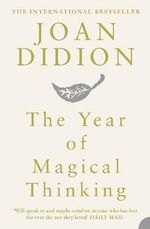If I had a list of Books To Read Before You Die, this one would be in the Top 20. I’ll show you why.

Joan Didion is considered to be one of the most important authors of 20th Century America. She’s a leading critic and essayist, and I am almost ashamed that I have lived for forty years before ever having been introduced to her work. As far as readers go, I’m pretty good, but the simple fact of having missed Didion is enough to make me feel pedestrian; impoverished, even.
The Year of Magical Thinking is an extraordinary book.
It documents Didion’s experience of her husband’s death—he died at the dinner table. And then the 12 months following, in that first flush of grief.
It is a book built on personal essays, which is Didion’s signature style. Her personality ripples through the book, as does her yawning sense of loss.
Joan Didion and John Gregory Dunne were married for as long as I’ve been alive. Unlike most couples, they were together almost 24 hours a day, 7 days a week: This because they were both writers. Not only was Dunne Didion’s spouse; he was her editor; he was her teacher; they learned, observed, and wrote together (even if they had separate spaces in which to do so). They worked on films together. Didion didn’t write any professional pieces for almost the entirety of that year, and acknowledges that each of them had been incapable of understanding what life would be like without the other.
At the same time as Didion was undergoing what is a ‘rite of passage’ of life for many, their daughter Quintana was desperately ill.
What Didion couldn’t have known during that year is that she would also soon lose her daughter.
The book is titled The Year of Magical Thinking, because in all of her dealings after John’s death, she kept thinking that if she did X, he would come back and do Y. Like, she couldn’t get rid of his shoes, because when he comes back he will need them. She describes her year in terms of this type of ‘magical’ thinking: That by her own thoughts, by her own actions, he will come back to life and everything will be ok.
This book is also beautifully crafted, as I am learning that Didion’s work is by default. She paid attention to style. Her small flourishes, of observation, of repetition, of the musicality of her work, are what makes this work such a breath-taking read.
Sitting on the couch alongside my own husband, expecting my first child, I read this as oceans of emotion poured out from amongst its pages and almost drowned me. I scrambled to find my own mental life-raft, in order to gird myself against someone else’s experiences.
I find myself reflecting on the notion that few writers today could produce something as extraordinary as this.
Then I remember that it took me forty years to stumble across Didion’s works and it stops me in my tracks. Perhaps, if I am to learn anything from this work, it’s that my own observations are valid. But it doesn’t necessarily mean that they’re true.
Anyway, you’ll find The Year of Magical Thinking at your local library (or any good bookshop).
Enjoy this? Get The Letter
1+ letters per month via email (sign up below) or in your real-life letterbox (for which you can sign up here instead):
